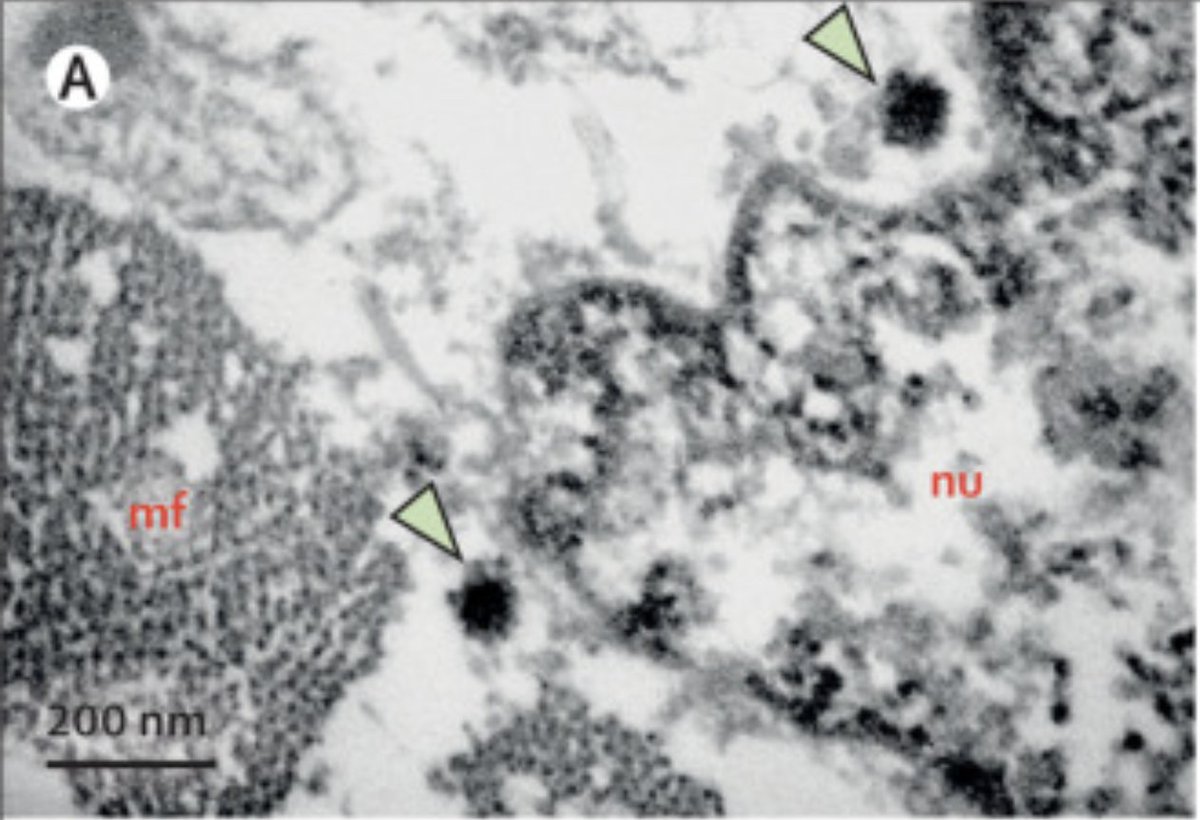Thought you knew all about the nastiness of #COVID19? Alas, we found that the virus can also infect and damage #heart cells, perhaps explaining cardiac complications. Kudos @SilviaMarchia @UWISCRM for spearheading this during difficult times! https://www.biorxiv.org/content/10.1101/2020.08.30.274464v1">https://www.biorxiv.org/content/1...
A thread with some context & explanations (2/n). We knew from late March that cardiovascular comorbidities are among the strongest risk factors for #COVID19 mortality, which was worrying but perhaps not too surprising per se (see https://www.thelancet.com/journals/lancet/article/PIIS0140-6736(20)30566-3/fulltext#.X0yCpw9Kd3o.twitter">https://www.thelancet.com/journals/... & https://ja.ma/2EwwAbf )">https://ja.ma/2EwwAbf&q...
3/n However, soon afterwards reports of myocarditis (inflammation of the heart) started trickling in both in the scientific literature and as word of mouth in the cardiovascular community. This did raise many eyebrows (see https://www.internationaljournalofcardiology.com/article/S0167-5273(20)31115-3/fulltext#.X0yD019EMSg.twitter">https://www.internationaljournalofcardiology.com/article/S... and https://imaging.onlinejacc.org/content/early/2020/08/05/j.jcmg.2020.05.004)">https://imaging.onlinejacc.org/content/e...
4/n Over the months, as the pandemic expanded from China to Europe and then the US, folks observed many other heart complications, such as arrhythmias (irregular beating), heart attacks, and even heart failure (reviewed very well in https://rdcu.be/b6y5z ).">https://rdcu.be/b6y5z&quo... More worrying still!
5/n The million dollar (and possibly lifes) question was: is this just another consequence of the excessive inflammatory response to lung infection, or does the virus directly affect the cardiovascular system? Answering this would help deciding the best treatment for patients
6/n We knew that both vascular and cardiac muscle cells express the protein used by the #COVID19 virus as a Trojan horse to enter lung cells (ACE2). However, ACE2 levels seemed low in heart muscle compared to other tissues - is it enough to matter? (see https://academic.oup.com/cardiovascres/article/116/6/1097/5813131#.X0yHrDDSyCI.twitter">https://academic.oup.com/cardiovas... )
7/n In mid March we found that also heart cells generated in the lab from so-called pluripotent stem cells expressed ACE2 ( https://twitter.com/berteroale/status/1239982223253573632?s=20).">https://twitter.com/berteroal... We reached out to virology labs @UW to test in this model whether the #COVID19 virus can infect the heart https://twitter.com/berteroale/status/1239984621283971072?s=20">https://twitter.com/berteroal...
8/n The @UW_GaleLab replied to our call for help, and we begun collaborating with them by using their newly-obtained #SARS_CoV_2 virus, grown in @UWVirology high biosafety laboratories. @SilviaMarchia downed her superhero outfit and bravlely led the charge https://twitter.com/SilviaMarchia/status/1277812837025341440?s=20">https://twitter.com/SilviaMar...
9/n We were planning all kind of ways to stress stem cell-derived heart cells, thinking that the virus would not be able to infect them otherwise. Oh boy we had underestimated it: the infection was rapid and MASSIVE already in healthy cells (magenta in the microscopic picture)
10/n Long story short, @SilviaMarchia found that the #SARS_CoV_2 not only infects heart cells, but it alters their ability to generate and conduct electrical signals, and to contract (basically all they do for a living). Most worryingly, eventually the virus can kill them.
11/n These findings agree with a recent study from @ArunSharmaPhD, @CliveSvendsen et al @CedarsSinai, ( https://www.cell.com/cell-reports-medicine/fulltext/S2666-3791(20)30068-9#.X0yNZHcCFHQ.twitter),">https://www.cell.com/cell-repo... who in April were the first to report heart muscle infection by #SARS_CoV_2 ( https://twitter.com/ArunSharmaPhD/status/1252976743146590209?s=20),">https://twitter.com/ArunSharm... also confirmed here ( https://www.sciencedirect.com/science/article/pii/S1934590920302824)">https://www.sciencedirect.com/science/a...
12/n A few days ago, @Juan_PerBer, @KSerahSera, @SarahJRockwood, @Camille_Rosa15, @ToddMcDevitt et al @GladstoneInst expanded these early findings and showed a dramatic effect of #SARS_CoV_2 on heart cells: the contractile structures seem to disassemble ( https://www.biorxiv.org/content/10.1101/2020.08.25.265561v1)">https://www.biorxiv.org/content/1...
13/n In this context our results indicate that #SARS_CoV_2 infection of heart cells and the associated disruption of cellular machineries can impair function (though we have yet to demonstrate a causal link). Lab-grown heart tissue become weak in less than a week! See before ...
14/n ... and after! Why is this important? The heart is one of the few organs virtually unable to regenerate: when approximately a billion heart cells die all at once (heart attack), the prognosis of nearly half of surviving patients is worse than most cancers.
15/n Does this all mean that #COVID19 is a heart virus? Let me be clear on this: IT DOES NOT (yet). The prevalence of myocarditis is still reportedly lower than for other viruses with established cardiotoxic effects. We and others studied the infection only outside of the body
16/ However, a recent report demonstrated for the first time that #SARS_CoV_2 can be found INSIDE heart cells in patients ( https://www.thelancet.com/journals/lanchi/article/PIIS2352-4642(20)30257-1/fulltext#.X0yTGQa60ho.twitter).">https://www.thelancet.com/journals/... Moreover, @ToddMcDevitt and colleagues observed signs of contractile machinery breakdown also in samples from #COVID19 patients.
17/n Therefore, #SARS_CoV_2 COULD be a cardiac virus, but much more work is needed to prove it, to understand which patients may be at higher risk, and to clarify the potential long-term consequences. The good news is that worst case scenario now we have models to test new drugs
18/n A worrying sign is that recent analyses of patients recovered from #COVID19 often show signs of moderate to severe cardiac injury ( https://ja.ma/32EnIs7 ).">https://ja.ma/32EnIs7&q... While we should not panic, the writing is on the wall that care must be taken to avoid long-term cardiac complications

 Read on Twitter
Read on Twitter




